the boss lady’s editorial
Let’s Decide Who To Kill
It seems that I get riled up when I listen to talk radio, and I want to argue with their points. But I’m usually in a car and don’t have my cell phone on me — and I know that if I tried to call I’d never get through and just waste a lot of minutes on hold using my cell phone while driving (a safe thing to do, isn’t it?). But I was listening to The Deborah Rowe Radio Program on WLS AM a night or two ago, the day the Supreme Court decided that it wasn’t right to allow capital punishment to minors (through age 17). And Deborah Rowe (the splendid Republican that she apparently is) thought it was totally wrong that the Supreme Court allowed this, when there are perfectly horrendous teens out there that she deems deserving the death penalty.
I’m sure these same Republicans believe that a fetus shouldn’t be killed (they’re against abortion), but they’re okay with killing people who’ve already been living a while.
Makes sense.
I heard Deborah Rowe going on about how it is right to kill these youngsters, after some of the details of their disgusting crimes are revealed. One caller even said on the radio that they were religious, and killing people is used a lot in the Bible.
And I thought, sure, in the Old Testament, but not the New Testament.
Then I head him say that he was a Roman Catholic.
So then I wondered why he was adhering to the Old Testament’s “eye for an eye” mentality (which I think all of us feel sometimes...), and not to the Christian New Testament, where Jesus told his followers to not listen to the words of his Father, but to listen to what He has to say.
I don’t claim to be religious, but can’t we all see fallacies in his argument?
After I heard these right-wingers talking about how right it is to kill kids when they feel that they deserve the death penalty, I thought I’d look at the Judge’s rulings myself, and also look into newspaper accounts of the ruling.
From the Washington Post, staff writer Charles Lane wrote on March 2, 2005, and quoted Justice Anthony M. Kennedy’s opinion:
“From a moral standpoint, it would be misguided to equate the failings of a minor with those of an adult, for a greater possibility exists that a minor’s character deficiencies will be reformed,” Justice Anthony M. Kennedy wrote in the opinion for the court.
Wow, at eighteen, people in this country are old enough to drive, vote, kill people in war as a soldier, and even get the death penalty. But they’re not old enough to legally drink. Oh, wait, I’m sorry, I’m bring up other subjects again. Let me get back to the judge.
“Our determination,” Justice Anthony M. Kennedy added, “finds confirmation in the stark reality that the United States is the only country in the world that continues to give official sanction to the juvenile death penalty.”
Ah, then we’re looking for that global scale again, which President Bush laughed at Senator Kerry for bringing up.
But then again, a global scale might not be a bad idea. I mean, think about it: we allow our teens to do things, but restrict them from doing other things. In European countries, you can have a soft drug like marijuana, and you won’t be put in the stockades for it. I think they also don’t impose the same strictness when it comes to drinking ages. I just think it’s funny that the United states allows people as they grow some rights, but not others.
How are kids supposed to grow and learn without a consistent set of rules to live by? And we’re the country with more violence than any other country. How strange...
Damn, there I go, rambling off on another tangent again. I guess there’s just so much that bothers me about how we run things here.
So let me get back to the death penalty thing. Stephen Boykewich of the Moscow Times wrote that while Justice Kennedy went on for 3 pages about international views of the death penalty for minors and mentioned that this was only support to his final decision to lift capital punishment for minors, Justice Antonin Scalia in his dissent wrote that “the views of other countries and the so-called international community take center stage.” Scalia then said the decision was “the subjective views of five members of the Court and like-minded foreigners.”
Hmm. Getting a little heated at the Supreme Court.
In Justice Kennedy’s notes about international law, he noted that we are the only country that allows the death penalty for minors. I know some acts committed by minors can be utterly heinous, but if they don’t have the adult mind to understand what they’ve done, do we have a right to kill them for it? Besides, it will probably end up costing less just to keep them in prison for life.
Yes, that’s what I said. Keeping them alive even costs less.
And no, I didn’t come up with that on my own. Sunfyre of http://www.sunfyre.com/deathpenalty.html wrote a long explanation of why this is true:
“The typical death penalty conviction must go through several levels of appeal. All these appeals must be heard by the courts in virtually every case. Attorneys are paid dramatically more than prison guards. One prison guard is responsible for several prisoners, where one prisoner on death row typically employs several attorneys and legal staff for many years, all while still using your tax dollars in prison. Life sentences are rarely appealed. The typical life span in prison is about two dozen years, many of the most violent prisoners get murdered in prison.”
That’s not the only source I could find. Phil Porter noted in The Economics of Capital Punishment, that:
A Duke University study found... “The death penalty costs North Carolina $2.16 million per execution over the costs of a non-death penalty murder case with a sentence of imprisonment for life.”
Sacramento Bee, March 18, 1988: “The death penalty costs California $90 million annually beyond the ordinary costs of the justice system.”
“A 1991 study of the Texas criminal justice system estimated the cost of appealing capital murder at $2,316,655. In contrast, the cost of housing a prisoner in a Texas maximum security prison single cell for 40 years is estimated at $750,000.”
“Florida calculated that each execution there costs some $3.18 million. If incarceration is estimated to cost $17,000/year, a comparable statistic for life in prison of 40 years would be $680,000.” (The Geography of Execution... The Capital Punishment Quagmire in America, Keith Harries and Derral Cheatwood 1997 p.6)”
Okay, I’ve got one more, and I think this is a good source. The Close Up Foundation looked into Capital Punishment in the United States, and Sharon C. Smith wrote and compiled this information:
“A death row inmate will have gone through the long and complex process of a two-stage trial, automatic review of sentence by state appellate courts, possible review in the federal courts, and a clemency hearing. All of this requires paid counsel for the trial and appellate processes. Then, of course, death row maintenance is expensive. Even with the restrictions placed on habeas claims of prisoners, a prisoner will see years go by between sentencing and actual execution.”
And the Close Up Foundation also noted that “it is true that it is currently more expensive to sentence a murderer to death than to LWOP (life without parole -ed.)...”
Well, those are some statistics for you. Although I’d wonder if so many people are put into prison than executed, there may be a chance that prison costs will be forced to go up, I don’t know.
And people can even complain that instilling the death penalty and capital punishment is Democracy at work, if we vote death penalty legislation, then a jury votes for death, it’s the people speaking. But Sunfyre of http://www.sunfyre.com/deathpenalty.html even had an answer for that: “It is democracy at work, only not the democracy Thomas Jefferson envisioned...Governors push the death penalty to get elected, District attorneys push it to get elected, high priced defense lawyers get more press.” He goes on to say that these “necessary evils of politics” help to harbor this desire for killing people convicted of crimes.
The point? ...Oh, I think the point was to talk about the death penalty being lifted for all under the age of eighteen by the Supreme Court. And there I go, extrapolating to how the death penalty is bad for everyone.
How obnoxious of me.
But I think, if we’re going to talk about lifting capital punishment for minors, we should talk about the pros and cons of that. I guess a pro is with the argument that if someone under eighteen commits a crime, they are not mature enough to know the scope and ramifications of what they have done. The pro is that if we allowed capital punishment to minors, then we would be allotting a mature — and severe, and final — punishment to an immature being.
Okay, good pro there. How about the cons for lifting capital punishment to minors?
Um... I can’t think of any.
Wait, I was listening to the Deborah Rowe show, where they were talking about how the lifting of capital punishment on minors was wrong. She talked about the heinousness of crimes committed by some minors.
Yes, capital punishment — killing people — gets rid of the heinous crimes, doesn’t it.
Wait, let me check the records... Capital punishment doesn’t deter people, I mean, it is a definite deterrent to stop the accused from committing the crime again to just kill them, but I don’t think capital punishment really deters people from committing crimes. Want proof? Fine (you guys are picky for wanting explanations).
Here’s a stat from the Uniform Crime Reports, Oct. 3, 1993. U.S. Department of Justice, F.B.I.: “The murder rate in the U.S. in 1992 was 9.3 murders per 100,000 population. 16 States had a murder rate higher than the national average. Of those 16 all but one, the sixteenth, was a death penalty State.” So states with higher murder rates were also states that allowed capital punishment. Interesting.
The Christian Courier’s Wayne Jackson even stated in an article (thought we’d go the religious route even on this one) that there was “an appeal of sorts to the Scriptures, allege that capital punishment is incompatible with the teaching of Jesus.” But when it came to whether or not capital punishment was a deterrent, Jackson pointed out that “no one can ever know how many potential murderers have refrained from taking human life due to their fear of prosecution, conviction, and ultimate execution.”
Good point, Jackson.
Evangelist Ted R. Weiland even wrote in Capital Punishment: Deterrent or Catalyst? that “when felons, such as Ted Bundy, can postpone their execution for prolonged periods of time by means of America’s appellate system, criminals are encouraged in their unlawful behavior rather than deterred.” He even thought about the rationale of the would-be criminal: “the prison system isn’t so bad. Heck, it’s three square meals, a bed, as much television as I want and I don’t have to work for a living!” And if they’re sentenced to the death penalty? “I have the appellate courts to rely upon. And, if my case is not overturned, how many years on death row will it be until they actually execute me. By then I’ll be an old man...” which may leave the odds in their favor.
He mentioned Ted Bundy. And you know, I heard of a study done showing that murder rates went down after Ted Bundy’s execution, so people thought there was a deterring factor in capital punishment. They then later figured out that the drops in murders were only in areas they analyzed, which were areas that also happened to get really cold, bad weather. In other parts of the country the murders rates did not change at all. Some even wondered after analyzing this study if weather was a better deterrent for murders than the death penalty.
While looking for more evidence about capital punishment, I figured that since I’m going out on these religious limbs here, I’ll even point out that ReligiousTolerance.org pointed out another good issue: “With the exception of professional hit-men, very few people are in a rational frame of mind when they kill others. It may be hopeless to expect any form of punishment to act as a deterrent.”
Wow, I keep hearing all of these rational arguments against the deterrence of these crimes, as well as the abolishment of capital punishment to minors. All I do know is that it doesn’t act as a deterrent, it costs less to keep people in prison for life, and, well, kids are just that — kids. If we don’t let them vote, or even die four our country by service in the military — why should we punish them like an adult for doing something terribly wrong?
Janet Kuypers
Editor In Chief

poetry
the passionate stuff

untitled
Bobbi Dykema Katsanis
what they don’t tell you in the guidebooks:
travel abroad is an exercise in math.
convert celsius to fahrenheit,
Danish Normal time to Pacific,
kilograms and liters and kilometers
to pounds, gallons, and miles,
dollars to kroner to euros to rubles to dollars.
it will become jumbled in your brain;
you may begin converting
kroner to celsius, meters to Daylight Savings Time,
and Greenwich Mean to rubles,
but after all,
even on vacation,
time is money.



news you can use

The Bait and Switch of “Intelligent Design” Creationism
By Keith Lockitch
 During an interview this week President Bush endorsed the teaching of “intelligent design”--the view that life is so complex it must be the product of a “higher intelligence.” This view is promoted as a scientific alternative to the theory of evolution. But is “intelligent design,” in fact, a genuine scientific theory or merely a disguised form of religious advocacy--creationism in camouflage? During an interview this week President Bush endorsed the teaching of “intelligent design”--the view that life is so complex it must be the product of a “higher intelligence.” This view is promoted as a scientific alternative to the theory of evolution. But is “intelligent design,” in fact, a genuine scientific theory or merely a disguised form of religious advocacy--creationism in camouflage?
 Proponents of “intelligent design” aggressively market their viewpoint as real science, insisting it is not religiously based. Writes one leading advocate, Michael Behe: “The conclusion of intelligent design flows naturally from the data itself--not from sacred books or sectarian beliefs.” Proponents of “intelligent design” aggressively market their viewpoint as real science, insisting it is not religiously based. Writes one leading advocate, Michael Behe: “The conclusion of intelligent design flows naturally from the data itself--not from sacred books or sectarian beliefs.”
 Proponents of “intelligent design” claim that Darwinian evolution is a fundamentally flawed theory--that there are certain complex features of living organisms evolution simply cannot explain, but which can be explained as the handiwork of an “intelligent designer.” Proponents of “intelligent design” claim that Darwinian evolution is a fundamentally flawed theory--that there are certain complex features of living organisms evolution simply cannot explain, but which can be explained as the handiwork of an “intelligent designer.”
 Their viewpoint is not religiously based, they insist, because it does not require that the “intelligent designer” be God. “Design,” writes another leading proponent, William Dembski, “requires neither magic nor miracles nor a creator.” Their viewpoint is not religiously based, they insist, because it does not require that the “intelligent designer” be God. “Design,” writes another leading proponent, William Dembski, “requires neither magic nor miracles nor a creator.”
 Indeed, “design” apparently requires surprisingly little of the “designer’s” identity: “Inferences to design,” contends Behe, “do not require that we have a candidate for the role of designer.” According to its advocates, the “designer” responsible for “intelligent design” in biology could be any sort of “creative intelligence” capable of engineering the basic elements of life. Some have even seriously nominated advanced space aliens for the role. Indeed, “design” apparently requires surprisingly little of the “designer’s” identity: “Inferences to design,” contends Behe, “do not require that we have a candidate for the role of designer.” According to its advocates, the “designer” responsible for “intelligent design” in biology could be any sort of “creative intelligence” capable of engineering the basic elements of life. Some have even seriously nominated advanced space aliens for the role.
 Their premise seems to be that as long as they don’t explicitly name the “designer”--as long as they allow that the “designer” could be a naturally existing being, a being accessible to scientific study--that this somehow saves their viewpoint from the charge of being inherently religious in character. Their premise seems to be that as long as they don’t explicitly name the “designer”--as long as they allow that the “designer” could be a naturally existing being, a being accessible to scientific study--that this somehow saves their viewpoint from the charge of being inherently religious in character.
 But does it? But does it?
 Imagine we discovered an alien on Mars with a penchant for bio-engineering. Could such a natural being fulfill the requirements of an “intelligent designer”? Imagine we discovered an alien on Mars with a penchant for bio-engineering. Could such a natural being fulfill the requirements of an “intelligent designer”?
 It could not. Such a being would not actually account for the complexity that “design” proponents seek to explain. Any natural being capable of “designing” the complex features of earthly life would, on their premises, require its own “designer.” If “design” can be inferred merely from observed complexity, then our purported Martian “designer” would be just another complex being in nature that supposedly cannot be explained without positing another “designer.” One does not explain complexity by dreaming up a new complexity as its cause. It could not. Such a being would not actually account for the complexity that “design” proponents seek to explain. Any natural being capable of “designing” the complex features of earthly life would, on their premises, require its own “designer.” If “design” can be inferred merely from observed complexity, then our purported Martian “designer” would be just another complex being in nature that supposedly cannot be explained without positing another “designer.” One does not explain complexity by dreaming up a new complexity as its cause.
 By the very nature of its approach, “intelligent design” cannot be satisfied with a “designer” who is part of the natural world. Such a “designer” would not answer the basic question its advocates raise: it would not explain biological complexity as such. The only “designer” that would stop their quest for a “design” explanation of complexity is a “designer” about whom one cannot ask any questions or who cannot be subjected to any kind of scientific study--a “designer” that “transcends” nature and its laws--a “designer” not susceptible of rational explanation--in short: a supernatural “designer.” By the very nature of its approach, “intelligent design” cannot be satisfied with a “designer” who is part of the natural world. Such a “designer” would not answer the basic question its advocates raise: it would not explain biological complexity as such. The only “designer” that would stop their quest for a “design” explanation of complexity is a “designer” about whom one cannot ask any questions or who cannot be subjected to any kind of scientific study--a “designer” that “transcends” nature and its laws--a “designer” not susceptible of rational explanation--in short: a supernatural “designer.”
 Its advertising to the contrary notwithstanding, “intelligent design” is inherently a quest for the supernatural; only one “candidate for the role of designer” need apply. Dembski himself, even while trying to deny this implication, concedes that “if there is design in biology and cosmology, then that design could not be the work of an evolved intelligence.” It must, he admits, be that of a “transcendent intelligence” to whom he euphemistically refers as “the big G.” Its advertising to the contrary notwithstanding, “intelligent design” is inherently a quest for the supernatural; only one “candidate for the role of designer” need apply. Dembski himself, even while trying to deny this implication, concedes that “if there is design in biology and cosmology, then that design could not be the work of an evolved intelligence.” It must, he admits, be that of a “transcendent intelligence” to whom he euphemistically refers as “the big G.”
 The supposedly nonreligious theory of “intelligent design” is nothing more than a crusade to peddle religion by giving it the veneer of science--to pretend, as one commentator put it, that “faith in God is something that holds up under the microscope.” The supposedly nonreligious theory of “intelligent design” is nothing more than a crusade to peddle religion by giving it the veneer of science--to pretend, as one commentator put it, that “faith in God is something that holds up under the microscope.”
 The insistence of “intelligent design” advocates that they are “agnostic regarding the source of design” is a bait-and-switch. They dangle out the groundless possibility of a “designer” who is susceptible of scientific study in order to hide their real agenda of promoting faith in the supernatural. Their scientifically accessible “designer” is nothing more than a gateway god, metaphysical marijuana intended to draw students away from natural, scientific explanations and get them hooked on the supernatural. The insistence of “intelligent design” advocates that they are “agnostic regarding the source of design” is a bait-and-switch. They dangle out the groundless possibility of a “designer” who is susceptible of scientific study in order to hide their real agenda of promoting faith in the supernatural. Their scientifically accessible “designer” is nothing more than a gateway god, metaphysical marijuana intended to draw students away from natural, scientific explanations and get them hooked on the supernatural.
 No matter how fervently its salesmen wish “intelligent design” to be viewed as cutting-edge science, there is no disguising its true character. It is nothing more than a religiously motivated attack on science, and should be rejected as such. No matter how fervently its salesmen wish “intelligent design” to be viewed as cutting-edge science, there is no disguising its true character. It is nothing more than a religiously motivated attack on science, and should be rejected as such.

 Keith Lockitch is a Ph.D. in physics and a junior fellow at the Ayn Rand Institute (http://www.aynrand.org/) in Irvine, CA. The Institute promotes Objectivism, the philosophy of Ayn Rand, author of Atlas Shrugged and The Fountainhead. Keith Lockitch is a Ph.D. in physics and a junior fellow at the Ayn Rand Institute (http://www.aynrand.org/) in Irvine, CA. The Institute promotes Objectivism, the philosophy of Ayn Rand, author of Atlas Shrugged and The Fountainhead.
Reprinted with permission from ARI. Copyright © 2005 Ayn Rand® Institute. All rights reserved.



eye on the sky

NASA-Funded Scientists Discover Tenth Planet

 A planet larger than Pluto has been discovered in the outlying regions of the solar system. A planet larger than Pluto has been discovered in the outlying regions of the solar system.
 The planet was discovered using the Samuel Oschin Telescope at Palomar Observatory near San Diego, Calif. The discovery was announced 07.29.05 by planetary scientist Dr. Mike Brown of the California Institute of Technology in Pasadena, Calif., whose research is partly funded by NASA. The planet was discovered using the Samuel Oschin Telescope at Palomar Observatory near San Diego, Calif. The discovery was announced 07.29.05 by planetary scientist Dr. Mike Brown of the California Institute of Technology in Pasadena, Calif., whose research is partly funded by NASA.
 The planet is a typical member of the Kuiper belt, but its sheer size in relation to the nine known planets means that it can only be classified as a planet, Brown said. Currently about 97 times further from the sun than the Earth, the planet is the farthest-known object in the solar system, and the third brightest of the Kuiper belt objects. The planet is a typical member of the Kuiper belt, but its sheer size in relation to the nine known planets means that it can only be classified as a planet, Brown said. Currently about 97 times further from the sun than the Earth, the planet is the farthest-known object in the solar system, and the third brightest of the Kuiper belt objects.
 “It will be visible with a telescope over the next six months and is currently almost directly overhead in the early-morning eastern sky, in the constellation Cetus,” said Brown, who made the discovery with colleagues Chad Trujillo, of the Gemini Observatory in Mauna Kea, Hawaii, and David Rabinowitz, of Yale University, New Haven, Conn., on January 8. “It will be visible with a telescope over the next six months and is currently almost directly overhead in the early-morning eastern sky, in the constellation Cetus,” said Brown, who made the discovery with colleagues Chad Trujillo, of the Gemini Observatory in Mauna Kea, Hawaii, and David Rabinowitz, of Yale University, New Haven, Conn., on January 8.
 Brown, Trujillo and Rabinowitz first photographed the new planet with the 48-inch Samuel Oschin Telescope on October 31, 2003. However, the object was so far away that its motion was not detected until they reanalyzed the data in January of this year. In the last seven months, the scientists have been studying the planet to better estimate its size and its motions. Brown, Trujillo and Rabinowitz first photographed the new planet with the 48-inch Samuel Oschin Telescope on October 31, 2003. However, the object was so far away that its motion was not detected until they reanalyzed the data in January of this year. In the last seven months, the scientists have been studying the planet to better estimate its size and its motions.
 “It’s definitely bigger than Pluto,” said Brown, who is a professor of planetary astronomy. “It’s definitely bigger than Pluto,” said Brown, who is a professor of planetary astronomy.
 Scientists can infer the size of a solar system object by its brightness, just as one can infer the size of a faraway light bulb if one knows its wattage. The reflectance of the planet is not yet known. Scientists can not yet tell how much light from the sun is reflected away, but the amount of light the planet reflects puts a lower limit on its size. Scientists can infer the size of a solar system object by its brightness, just as one can infer the size of a faraway light bulb if one knows its wattage. The reflectance of the planet is not yet known. Scientists can not yet tell how much light from the sun is reflected away, but the amount of light the planet reflects puts a lower limit on its size.
 “Even if it reflected 100 percent of the light reaching it, it would still be as big as Pluto,” says Brown. “I’d say it’s probably one and a half times the size of Pluto, but we’re not sure yet of the final size. “Even if it reflected 100 percent of the light reaching it, it would still be as big as Pluto,” says Brown. “I’d say it’s probably one and a half times the size of Pluto, but we’re not sure yet of the final size.
 “We are 100 percent confident that this is the first object bigger than Pluto ever found in the outer solar system,” Brown added. “We are 100 percent confident that this is the first object bigger than Pluto ever found in the outer solar system,” Brown added.
 A name for the new planet has been proposed by the discoverers to the International Astronomical Union, and they are awaiting the decision of this body before announcing the name. A name for the new planet has been proposed by the discoverers to the International Astronomical Union, and they are awaiting the decision of this body before announcing the name.
 The newfound planet in our solar system right now is called 2003UB313. Scientists did not discover that the object in 2003 pictures was a planet until 2005.



poetry
the passionate stuff

Night in the Sepulchre
Michelle Greenblatt
For the man who brought me back
I am gathering crow feathers
in the hopes that I can
 cross over to the other cross over to the other
 side side
 with some goddamn help with some goddamn help
 for once. for once.
Or I can light these alkali papers on fire;
I like fires; I light them all the time
to remind you of how you
made me burn:
that incendiary
night you left then called me
crazy
&
a liar
about what happened in the alley,
to your friends,
A LIAR.
That night, a black smudged
 X X
carved onto each side of my
face, each bitten breast,
scratched arm, bloody cunt
smeared in the soot of lies
 (The other (The other
 side: side:
The man
in the alley
holding a gun
under my chin
pressed against
my neck,
and his
 hands.) hands.)
You shoved me into the
sepulchre
 with the rest of the rotting bodies. with the rest of the rotting bodies.
I thought I fit there,
though the next day you came back
to me,
by then I thought I was dead
again.
11.23.2003-7.28.2005

happy birthday to Michelle on August 21st!



À TU, LA VICTIME
Aaron Wilder
I’m sorry, but I can’t be your guidance counselor anymore.
I’m sure that I’ll never see an end to it all.
An end to all your drama.
You’re always playing the central actress in tragedy after tragedy.
Stop acting like that correctional institute inmate from California.
You haven’t the slightest thing in common with her.
That is not where your bones will rest and neither of us will be your
mortician.
Just stop the screaming, the kicking, the tears of agony.
You’re not the victim this time.
We are not dating, so stop acting like it.
Stop trying to make your life worse than everyone else’s.
It’s getting old and I don’t care anymore, as restless as you’ve made me.
You swing your life by the sappy rock lyrics you dramatize.
You’re not one of those kids of that rock wife,
the ones who changed their names and ran away.
They remind me more of myself than you.
Of the two of us that ran away, I’m the only one who’s changed names.
You still state yours proudly, linking you to your family and past,
as I shudder when my old name is shouted or even whispered,
the one I left in Phoenix with the darkness of my old life.
It’s the one I thought I left behind with you,
but, you’ve chased me up here to plague me
with what I didn’t want to relive.
You followed me as I ran away as far as my wallet could bear,
Just to hear you play the victim all over again.
All you wonder is why I’ve changed.
Why haven’t you?
But none of that matters, nothing concerning me matters to you.
Your subconsciously self-inflicted crises
are all you expect my life to revolve around.
But I can’t communicate this to you in English.
This over-use of the subjunctive of emotion is all you’d hear.
My poor little victim,
how much will it cost for you to stop rocking my boat
already overturned in this unsteady sea?
Find some new life support,
this crutch can’t hold you up anymore.
Please find a way to be happy that doesn’t make me miserable.
Oh yeah, and stop making yourself the victim,
I don’t buy it.


LIFE SENTENCE
Camille Dull
I live one long run-on
Sentence chaotic
Adjectives bumping
Quaking adverbs crashing
Dichotomous nouns splashing
Pools of vowels reeling
Contradictory phrases scintillating
Synonyms cajoling metaphors murmuring
Conjunctions coalescing, evaporating
Dangling participles sending
Rumbling spasms of verbs churning
Tumbling, falling, sliding
Slipping slowly
Fading
Gone


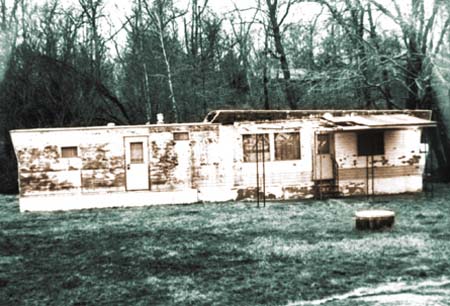
Broken Home
Vivian Torvik
Thick as fog,
the truth
you live each day as
an animal trapped,
our new home
a cage
I could not leave
Secrets,whispers
all of who we became
spread like seeds
across an empty field
Flowers grew
as soon as they died
and death became our disease
I could not watch who you became
to leave, to be strong
 A million tears shed
A million tears shed
as a wildfire burned
in my newfound freedom
Pain I put unto you
my river, my wind
locked away
behind black bars
your soul a cloud of dust
I do not regret
of an expression made
My paradise has been found
past the thick fog
of your misery


My Steel Toes
Jason Robinson
oxblood in color
Doc Martens
these boots i wore
across america and
back
i had the idea that
my footwear
could double as
a weapon
or as a work tool
in the labor pool
in my city of
destination
when i was
broke
drunk
evil
and alone
these boots
i slept in
i dared not
take them off
for fear of theft
my boots survived
san diego
skid row in los angeles
stinky greyhound
across west texas
and the pregnant girl
with rotten teeth
scratched they
brought me back to
carolina
they sit in my closet now
polished and
revered


Monday
Arthur Gottlieb
Smothering the loud mouth
Alarm in a pillow,
I scheme to stay in bed.
Too ill to call in sick
I quit my job selling
Snow to eskimos.
The unfed puppy whines
In his puddle of piss.
Neighbor kids kick the wall
Like innocent prisoners
Playing ball indoors.
I ooze booze.
Last night’s mash rumbles
My stomach, an explosive
Chemical mix of wine & vodka
Stirring thunder and white
 lightning. lightning.
Bones bicker about getting
To the toilet in time, but
Flesh crawls to the craw
Of the bowl. Hanging my head
Over its maw in disgust,
I spilling my guts into its deaf
Porcelain ear, but gain no
 absolution. absolution.


Anesthesia Euthanism
Ray Karpovage
I am the dry mouth lemon swabbed
with thick tongue. Just one sediment
piss past appendix stone.
In steep stagnetic steps-I
walk-off inkblot blood-clots
on a stapled flesh stretch.
Tripping over umbilical extension
chords with grip tape socks
and gap-tooth whistling cartoon theme songs
down the echo of this morphine drip.
Blank-minded utopia has ruptured itself
and my jumper cables are rusty.
From the drip/the hole in my lip.
The spilt sips of subliminal
backwash with their varicose spiderings.
They make me choke back formaldehyde.
Comfortably, in a reclining contusion
covered with candy-coated
catheters and cold chipping sheets.


Up against it
Vincent Spada
Ran up against it,
and got knocked down
No surprise, that happens often
Got back up,
and tried again
Same results, but I go on


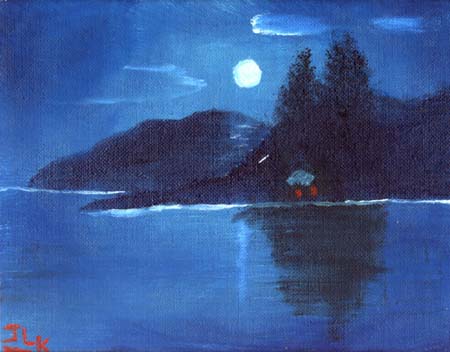
A NIGHT SWEAT
Bradford Allison
when I wake up in the middle of the night,
be it a nightmare, or too hot, or have to
piss,
I reach for you,
the way a child reaches for a mother,
upon skinning a knee,
or a small dog,
pushes its head into an owners foot.
I hold you as tight as I possibly can,
before my grip would
wake you up,
as if to say to visiting souls,
“you can not take her.
she is mine.”
and before I drift back off,
I say these words to myself,
I swear to God I do,
I say,
“I still can not believe that you
are mine.”
you, my love, are an essential part of me.
for without you,
I would
fall apart.


AUTISM
Brian M. Burke
I am forever pulled
in pain and doubt
The screaming never ends
a constant backache that begs
the question
Is it age
or one two three many liftings?
He’s up on the table again
He’s at the refrigerator
pulling clothes out of drawers
spilling blocks on the floor
And the screaming
 always the screaming always the screaming
the looks from strangers
Not quite pity
But when he sleeps
when he climbs into my lap
 up please daddy up please daddy
looking for a kiss
perhaps one day
Perhaps.



Spring Flower
art by Edward Michael O’Durr Supranowicz


CARE?
Chris Major
It’s so hot,
and there’s so much disease.
They lie in rags,
saggy skin pitched
on protruding ribs;
desperate for water
and too weak to eat,
many die sore-covered
and forgotten.
And tomorrow,
there’s more of the same,
as they helplessly wait
for dawn to break
to a chorus of
moans,
groans,
and clattering bedpans.......



Winter Leaves
Jane Stuart
Fallen winter leaves
stick on rain-soaked clumps of grass
frozen in cold ground;
Wind blows starlight through night’s trees,
moonlight gleams on coldest grass




That Man
Mark D. Cohen
Today is August 14th
I just paid $2.59 for a gallon of gas
On August 1st, I paid$2.29
Do not talk to me about diminishing reserves
This is all about international geo-politics
And the Arab nations being absolutely furious
About what happened at Abu Ghraib
And here I sit in my living room
In total amazement
I simply cannot believe the things
That man on Pennsylvania Avenue
Has done to MY country
Meanwhile the rednecks wave the flag
And raise the flagpole
The flagpole that is going to knock us all to the ground
Sooner than we think
Sunday, August 14, 2005


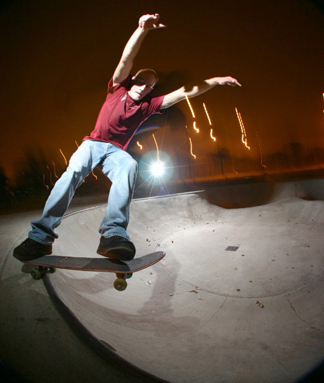
art by Joel McGregor
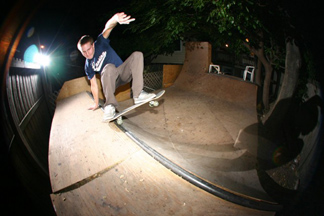
|
Starting Points (6)
Michael Ceraolo
In the parking lot across the street
I saw some young people car-surfing
And later I saw some skateboarders
performing some amazing stunts
And I saw (and heard)
many motorcyclists roar by
And all of this was intercut
with occasional bicyclists
 And And
while I do none of these things,
with the exception of riding a bicycle,
I applaud their self-expression
But none of them was wearing a helmet
This is not to be a screed
against the younger generation,
 or or
an authoritarian argument
for mandatory helmet laws,
 but but
an inquiry into the nature of freedom
Aren’t these examples of a childish ’freedom’ ,
an I’m-not-going-to-do-this-and-you-can’t-make-me
(complete with sticking out of tongue),
for I feel safe in saying
that every single one of them would accept
third-party paid health care
for any injuries that might occur
Wouldn’t signing a waiver disclaiming
any intention to accept someone else’s payment
be the sign of a truly adult freedom
that acutally accepts responsibility?
Now multiply this one example
by incorporation, etc.,
 and and
you come up with the answer
that we need a new starting point


THE GHOST VOICE
Luis Cuauhtemoc Berriozabal
The ghost voice
told me
to quit my job
and get on a bus
to find my wife.
The ghost voice
gave me
the voice of a frog,
and insisted I
was really a prince.
The ghost voice
told me
to buy books on
witchcraft and to
cast magic spells.
The ghost voice
won’t leave.
It tells me it
will bury me and
sing at my wake.


Prediction (translated from Russian)
Alex Galper
On February 21, 1205
In the noise of busy marketplace
Lost in the Middle East,
An astrologer-sage predicted
That in 800 years exactly
I would get myself drunk as a cobbler
And when a girl starts playing
With my belly button
I shall cry like a baby,
And get horrified that
At any moment
I will get unwrapped
And break apart in thousand pieces.


Dawn
Karen R. Porter
Dawn bruises
morning’s cheek,
stretching
into the ache,
head pounding,
fist beating
a relentless rhythm
on a merciless,
throbbing sun
burning its way,
carving red,
blinkered eyes.
Then blood
begins
to know itself
for fire.


My Way World Has To Be
 To Get Rid Of War To Get Rid Of War
There was the big bang
and world was starting
fresh over again dream
as from this beginning
whoever was assistance
wherever they needs it
with everything healed
instead the particular
everybody got together
World that was secular
was their much happier
place for people to be
© 2005 Frank Anthony


Trying To Fit In Place
 Without Belonging Without Belonging
Dream my exceptionally
long pair pant hanging
three different colors
take up special spaces
I will never wear them
but had to dream of it
if something important
happens to those pants
Dream is of a thinking
process very different
to fit into my society
never becomes a quorum
killing of brown moths
© 2005 Frank Anthony



poetry and prose
the meat and potatoes stuff

The Man With No Home.
Dan Provost
With a quick reflex
of judgment, Laura was
appalled at the sight of
a homeless man sleeping
next to her mailbox
To make it worse, he was an African-
American with a nose ring.
As Laura scurried out of the way, rushing
to her car to avoid being seen by the man,
she threw all of her mail on the ground.
The man with no home, hearing the heavy footsteps of someone running—woke up, yawned, scratched his head and picked up her mail.
As he picked up a bill from A T&T, he called out in a heavy accent,
“Lady...Hey Lady.”
Laura, thirty years old, overweight, and overwrought—stopped her frantic trot.
Not to confront the man, but being way out of shape, her panting was just too much to physically bear.
She slowly turned toward the man; ready to give him anything he wanted.
Money.
Credit cards.
But please, no sex...no forced sex.
Not with a black person.
The man with no home—wearing soiled circa 1979 gym shorts and a tattered striped shirt with the breast pocket flailing in the wind; again called to Laura.
He smiled and said, “Miss, you dropped your mail”, and handed her the stack of letters, coupons, and catalogs.
Laura, less intimidated—in fact now agitated; angrily took her mail and told the man with no home.
“Why don’t you get a job and find another place too sleep.”
She gave the man a piercing stare as she entered her Toyota, put the car in drive and sped off.
The man with no home shrugged his shoulders then picked up the rest of his belongings—a blue sleeping bag with the goose feathers flying out, a bible, and a pack of Marlboros.
He lit a cigarette, and with weary, blood shot eyes—gazed down the road where the accepted live.
He then opened his bible to where the verse “Forgive and Forget” appeared.
The man with no home silently chuckled to himself and began walking down the other side of the street.
Hoping to find another vacancy to call home tonight.


HALF COCKED
G.A. Scheinoha
 “I don’t want blood on our understanding.” Which didn’t explain why she’d felt it necessary to bring along what appeared to be a large frame, very powerful pistol. And now aimed it down a blade sight sight big as her nose at me. I’m no expert with guns but just knew I couldn’t possibly have made her THAT angry. She must be mistaking me for some other s.o.b. “I don’t want blood on our understanding.” Which didn’t explain why she’d felt it necessary to bring along what appeared to be a large frame, very powerful pistol. And now aimed it down a blade sight sight big as her nose at me. I’m no expert with guns but just knew I couldn’t possibly have made her THAT angry. She must be mistaking me for some other s.o.b.
 About then I got the sudden urge to rush her. True, I could see the long bluish barrel, the hefty maw at the end, black as a cave in the side of our future, yawning, terrifying, even the five other bullets in the cylinder, their points glinting with the dead on, never wavering stare of a serpent. Yet none of it seemed especially real. About then I got the sudden urge to rush her. True, I could see the long bluish barrel, the hefty maw at the end, black as a cave in the side of our future, yawning, terrifying, even the five other bullets in the cylinder, their points glinting with the dead on, never wavering stare of a serpent. Yet none of it seemed especially real.
 BLAM! the thing went off. I think something exploded inside my head as well. What’re you, nuts? “Why, you b--” I screamed, the words caught in my throat as blood oozed between my clenched fingers over my left shoulder where the slug had torn through the sleeve, scoured out a chunk of meat the size of a grapefruit. At least I thought so. BLAM! the thing went off. I think something exploded inside my head as well. What’re you, nuts? “Why, you b--” I screamed, the words caught in my throat as blood oozed between my clenched fingers over my left shoulder where the slug had torn through the sleeve, scoured out a chunk of meat the size of a grapefruit. At least I thought so.
 “Aww, quit your bellyachin’,” she cooed. “It’s only a scratch.” She thumbed back the heavy hammer, pulled the muzzle up from the haphazardly pointed general direction of my groin. . . to where it “Aww, quit your bellyachin’,” she cooed. “It’s only a scratch.” She thumbed back the heavy hammer, pulled the muzzle up from the haphazardly pointed general direction of my groin. . . to where it
 could inflict a second belly button. “Besides, you’re gonna hurt worse than that before we’re through.” could inflict a second belly button. “Besides, you’re gonna hurt worse than that before we’re through.”


A Woman and Her Dead Husband
— After reading Russell Edson
Corey Cook
 A woman couldn’t bring herself to bury her dead husband. She decided that the two of them would continue their cohabitation. During the day the woman propped her husband up with plush pillows in his Lazy-Boy. At night she dragged him into the bedroom and hoisted him up onto the mattress. The woman would take the man with her when she ran errands as well. She would carry his limp body out to the car and flop him in the passenger’s seat. He would ride to the grocery store with his eyes closed and mouth open - head beating against the glass. A woman couldn’t bring herself to bury her dead husband. She decided that the two of them would continue their cohabitation. During the day the woman propped her husband up with plush pillows in his Lazy-Boy. At night she dragged him into the bedroom and hoisted him up onto the mattress. The woman would take the man with her when she ran errands as well. She would carry his limp body out to the car and flop him in the passenger’s seat. He would ride to the grocery store with his eyes closed and mouth open - head beating against the glass.
 The woman’s friend stopped by for tea and asked her, “Don’t you think you should bury your husband? He has become a burden to you in his death.” The woman’s friend stopped by for tea and asked her, “Don’t you think you should bury your husband? He has become a burden to you in his death.”
 “I cannot do that. Death yields new life. I must wait...” the woman replied as she smiled at her husband - her right arm around his slackening shoulders. “I cannot do that. Death yields new life. I must wait...” the woman replied as she smiled at her husband - her right arm around his slackening shoulders.



poetry translations

 Have To Ask, in Bengali
translation by Marina Arturo



Saving Yourself, in Arabic
translation by Jacob Best



On the California Streets, in Bulgarian
translation byAeon Logan



Down the Drain, a Chinese translation
translation by Sue Matsushita



Maybe That Is Enough, in Gurmuckhi
translation by Shannon Peppers



I Have My Dreams, in Greek
translation by Courtney Steele



performance art
08/14/05 Beach Poets Feature

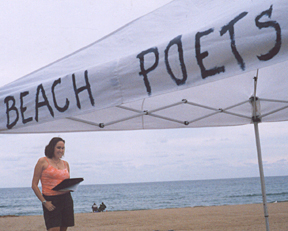
Burn It In
(portions)
Once I was at a beach
off the west coast of Florida
it was New Year’s ev
e
and the yellow moon hung over the gulf
like a swaying lantern.
And I was watching the waves crash in front of me
with a friend
and the wind picked up
and my friend just stared at that moon for a while
and then closed his eyes.
I asked him what he was thinking.
He said, “I wanted to look at this scene,
and memorize it, burn it into my brain,
record it in my mind, so I can call it up when I want to.
So I can have it with me always.”
I too have my recorders.
I burn these things into my brain,
I burn these things onto pages.
I pick and choose what needs to be said,
what needs to be remembered.


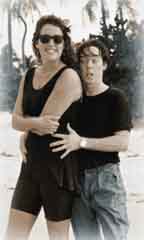
david
(portions)
 I remember being in your car, driving back from Tiger Tail beach. My skin felt itchy from the salt. My feet were sticking out the window, pressed against the rear-view mirror. I think you were holding my hand. I remember being in your car, driving back from Tiger Tail beach. My skin felt itchy from the salt. My feet were sticking out the window, pressed against the rear-view mirror. I think you were holding my hand.
 This was after you told me you wanted me to marry you. You never asked me to marry you, but you told me that’s what you wanted. You later even gave me an engagement ring, and emerald-cut emerald, but first said it was a Christmas present, apparently never willing to actually ask. This was after you told me you wanted me to marry you. You never asked me to marry you, but you told me that’s what you wanted. You later even gave me an engagement ring, and emerald-cut emerald, but first said it was a Christmas present, apparently never willing to actually ask.
 I remember thinking that we could never get along for any reasonable length of time. You didn’t want to leave Canada; I didn’t want to leave the States. You wanted to backpack around Europe; I wanted to get a job, an apartment, some security. Vacationing at the tip of this peninsula seemed to be the only way we could meet. I remember thinking that we could never get along for any reasonable length of time. You didn’t want to leave Canada; I didn’t want to leave the States. You wanted to backpack around Europe; I wanted to get a job, an apartment, some security. Vacationing at the tip of this peninsula seemed to be the only way we could meet.
 But even though my skin hissed from the salt and the sun, in that car with you I felt like we could go anywhere. But even though my skin hissed from the salt and the sun, in that car with you I felt like we could go anywhere.


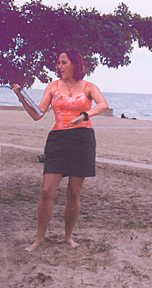
I Dreamt About You Last Night
(portions)
“I dreamt about you last night
and I fell out of bed twice
you can pin and mount me
like a butterfly”
 - Steven M. - Steven M.
They say that dreams are your
chance to think over the things
unresolved from your day. And
I keep dreaming about you.
Don’t I think about you enough?
You’re the one who died.
You’re the one that left me.
Why are you coming back,
at night, when I let my defenses
down, slipping in through my
window and working your way
into my dreams?
I dreamt about you last night.
I was on a cruise ship, and you
were working as a waiter. You wore
one of those silly short jackets
in your uniform. It was a sea blue.
And every time I thought I saw you
you would turn away to do your
job on the boat.
All I ever caught were fleeting
glimpses of you, walking away.
All I keep thinking is that
my days are finally free of you
but they’re not. I keep thinking
of you. And it isn’t enough.
I still can’t escape you at night.


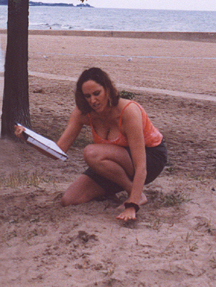
coquinas
(last two parts)
2
we would take boat rides
off the coast,
my parents and their friends
to a tiny island
dad drinking beer
the women,
sitting together in the shade
worrying about their hair
i would sit at the front
sunglasses, swimsuit and sunburn
feeling the wind
slapping me in the face
docking at a shoreline
everyone jumping out
little bags in their hands
the women go looking for shells
the men go barbecue
after an hour or two
the sandwiches, potato chips eaten
the soda and beer almost gone
we turn around and head back
we have conquered
3
and I remember the coquinas
the little shells,
you could find them alive
on the beaches north of the pier
going to the beach
I would look for a spot
to find them
they burrowed their way
into the sand
to avoid the light
worming their way away from me
I unearthed a group of coquinas once,
fascinated with their color of
their shells, the way they moved
before they could hide
I collected them into a jar,
took them home with me
what did you teach me
what have you taught me to do
is this it
is this what has become of me
and I took them home
I added salt water and sand
but I couldn’t feed them
I realized soon that they
would die
so I let them


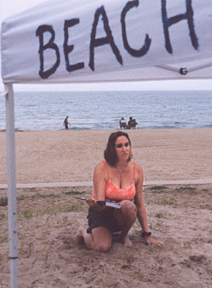
a child in the park
(portions)
 this was no ordinary park, mind you: there were no swings or children laughing; there were different children there. this was no ordinary park, mind you: there were no swings or children laughing; there were different children there.
 People drove golf carts around in the park, or large tricycles, or older couples would walk together just as it was beginning to turn to dusk and long shadows from tree-tops cris-crossed in front of them. In the afternoons, the women would be in the water, wearing hats and sunglasses. People drove golf carts around in the park, or large tricycles, or older couples would walk together just as it was beginning to turn to dusk and long shadows from tree-tops cris-crossed in front of them. In the afternoons, the women would be in the water, wearing hats and sunglasses.
 I spent hours at the water, playing imaginary games, pretending I was grown-up, feeding the birds, watching the fish swim around my feet, looking for turtles, listening to the wind. I spent hours at the water, playing imaginary games, pretending I was grown-up, feeding the birds, watching the fish swim around my feet, looking for turtles, listening to the wind.
And there was Ira and Betty Wiggins, who lived on the next street, Sand Drive, with a sign in front of their house that said, “The Wiggins’ Wigwam.” Once they saw me and asked if I wanted to catch a lion. They then went to the side of the road, and with a spoon pulled an ant lion from the top of a sand hill.
 It was like another world there. The park was where I spent my Christmases, my Easters. I remember swimming in the water, a week shy of thirteen, when my parents told me I was an aunt. Actually, my sister had a son, so they told me I was an uncle. Now I talk to my sister on the phone, she asks me if I remember so-and-so from the park. The couple that had the snow shovel against their light post with the words “rust in peace” painted in white on the metal. Yes, I say, I remember them. Well, so-and-so passed away last week, she says. Heart attack. This is what it comes down to, I think, all these memories are slowly disappearing, like grains of sand in the wind at the beach. So many memories. Where there are palm trees everywhere. It was my other world, my other life, another lifestyle, another everything. This was not an ordinary park, but the children were so much wiser, and still so full of life. So much to teach. So little time. It was like another world there. The park was where I spent my Christmases, my Easters. I remember swimming in the water, a week shy of thirteen, when my parents told me I was an aunt. Actually, my sister had a son, so they told me I was an uncle. Now I talk to my sister on the phone, she asks me if I remember so-and-so from the park. The couple that had the snow shovel against their light post with the words “rust in peace” painted in white on the metal. Yes, I say, I remember them. Well, so-and-so passed away last week, she says. Heart attack. This is what it comes down to, I think, all these memories are slowly disappearing, like grains of sand in the wind at the beach. So many memories. Where there are palm trees everywhere. It was my other world, my other life, another lifestyle, another everything. This was not an ordinary park, but the children were so much wiser, and still so full of life. So much to teach. So little time.


Freedom just past the Fence
After working for the Army
for years on repairing jet engines
I ended up being stationed
in Pennsylvania one summer
repairing air conditioners
and refrigerators.
I’d only do a little work
and then have nothing to do
for a day or two.
But the thing I remember
is that at the time Cubans
were defecting to the United States
by boat.
They’d sail to Florida,
most of then dehydrated
and all of them malnourished.
The U.S. government
didn’t want them spreading diseases
in our country,
so when the Cubans would appear
off the coast of Miami,
the military would be waiting
to make sure they were healthy.
Well, all I knew
was that they got all these Cubans
into trucks we called “cattle cars”
with only a few benches
and trucked them up to
Pennsylvania, where I was,
and the military them some shots
to make sure they weren’t dying.
So these people, after
escaping their country
in a shoddy wooden boat
were taken by the U.S. military,
herded into a boxed-in truck
and shipped up the country
so they could be given shots
and detained.
These Cubans,
who came here wanting freedom,
now had to wait
in a fenced-in area
until they were tested
and given food.
And it was my job
to make sure that
their fridge and
air conditioner was working.
So I sat there for
a day or two at a time,
drinking cans of beer,
and looking out my window.
I had a view of the razor wire fence
and all I remember
was seeing all of these Cubans
leaning on the chain-link fence,
wondering if this was what it was like
to be free,
holding on to the metal,
looking out to what they were sure
was freedom.


in the air
(portions)
Over Phoenix, preparing for another
descent at 8:50 p.m., but it’s usually fifteen
minutes late, as it is now, I’m getting
used to the schedule now. The mountains look
like the little mountains you see on
topographically correct globes, little ridges,
as if they’re made of sand, if you just lean
your head down a little bit, your exhaling
can make them all blow away in the
breeze.
I love the city lights from above at night.
Have you ever thought of how much power
it takes to light all those buildings?
All that energy. And every time I look,
look out that little window with rounded corners,
what i see are strings of yellow Italian Christmas
lights strung across the ground.
Fly in the air from somewhere
warm and dry
to somewhere
warm and humid...
Over Fort Myers, the city always looks
different from any other place, all those
palm trees, the marshes. Like you’ve just
landed somewhere foreign, and pretty soon
the big tour will begin. You can feel the
heat, the humidity sticking your shirt to
your back between your shoulder blades,
and your neck, sticking to your neck too,
from inside your cabin, before you even land.
I like the window seat in an airplane,
I like to look out the window. Clouds look like
cotton balls when you’re above them,
and when you’re landing cars look like
little ants, on a mission, bringing food
back to their hill. Little soldiers, back
and forth, back and forth. And the
streets look like veins, capillaries in some
massive, monstrous body. And the
farmland looks like little squares of colors.
I wonder why each plot of land is a
different color, what’s growing there
that makes them different. Or maybe
some of them are turning shades of red
and brown because some of them are dying.
And it always seems that you’re stuck
sitting next to someone that is either
too wide for their seat, or is a businessman
with their newspaper stretched out
and their lap top computer on their little
fold out table. Or behind you is a little kid,
bawling their eyes out on half the flight,
kicking your chair the other half.
Once, when I was on a
flight back from D. C., a flight attendant
walked by, stack of magazines in her
hand, Time, Newsweek, Businessweek,
and I stopped her, asking what magazines
she had. And she replied, “Oh, these
magazines are for men.” This is a true
story. And I asked her again what she
had. I had already read Time, so I took
Newsweek.


age
(edit)
 Sometimes, when I get behind the wheel of a car, I feel like I’m at Six Flags Great America Amusement Park In Gurnee, Illinois again and I’m thirteen years old and I’m able to drive one of the bumper cars. And it’s such a thrill -- because, I mean, I’m thirteen years old and I can’t drive, and I’m now in control of this huge piece of machinery. Granted, there’s this wire sticking up from the car that gets electricity from the ceiling, but for once I feel free, that I can just go, go faster than I ever could by running, or even if I used my roller skates or my bicycle. Sometimes, when I get behind the wheel of a car, I feel like I’m at Six Flags Great America Amusement Park In Gurnee, Illinois again and I’m thirteen years old and I’m able to drive one of the bumper cars. And it’s such a thrill -- because, I mean, I’m thirteen years old and I can’t drive, and I’m now in control of this huge piece of machinery. Granted, there’s this wire sticking up from the car that gets electricity from the ceiling, but for once I feel free, that I can just go, go faster than I ever could by running, or even if I used my roller skates or my bicycle.
 And when I get that feeling and I’m behind the wheel of my car I want to drive really really fast out on an abandoned road, blare some rock music, roll down my window, and turn up the heat, since it’s the middle of winter. And when I get that feeling and I’m behind the wheel of my car I want to drive really really fast out on an abandoned road, blare some rock music, roll down my window, and turn up the heat, since it’s the middle of winter.
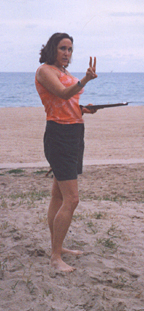
 Sometimes, when I go out on a new date, I feel like I’m sixteen again, and I’ll rifle through my closet, deciding I have absolutely nothing to wear. And he’ll pick me up, and we’ll go to a restaurant with deer heads on the walls, and we’ll have whiskey sours, and we’ll struggle with the lettuce leaves in the salads because they’re too big and you’re not supposed to use your knife, and when we’re done with dinner we’ll go to a bar that’s so crowded and so loud that we won’t be able to talk to each other, but we’ll have to stand real close. Sometimes, when I go out on a new date, I feel like I’m sixteen again, and I’ll rifle through my closet, deciding I have absolutely nothing to wear. And he’ll pick me up, and we’ll go to a restaurant with deer heads on the walls, and we’ll have whiskey sours, and we’ll struggle with the lettuce leaves in the salads because they’re too big and you’re not supposed to use your knife, and when we’re done with dinner we’ll go to a bar that’s so crowded and so loud that we won’t be able to talk to each other, but we’ll have to stand real close.
 And then he’ll take me home and I’ll invite him in, he’ll sit on the chair, I’ll sit on the couch, and he’ll ask for a glass of water. When we can’t think of any more small talk, and the clock says 3:12 a.m., I’ll see him to the door, he’ll kiss me good-bye, and I’ll lock the door after he leaves. And when I’m sure he can’t see me through the window, I’ll turn on the stereo and dance in my living room before I go to bed. And then he’ll take me home and I’ll invite him in, he’ll sit on the chair, I’ll sit on the couch, and he’ll ask for a glass of water. When we can’t think of any more small talk, and the clock says 3:12 a.m., I’ll see him to the door, he’ll kiss me good-bye, and I’ll lock the door after he leaves. And when I’m sure he can’t see me through the window, I’ll turn on the stereo and dance in my living room before I go to bed.
 Sometimes, when I get home after 10 o’clock from working overtime on the computers, I just want to retire, to quit the work, to stop it all. I see my parents, after a life of working at the construction site and raising five children, now beginning to relax, buying a small home in Southwest Florida, playing tennis in the morning, playing cards in the afternoon, drinking with other retired couples in the evening. Sometimes another couple invites them out for a boat ride off of Marco Island, where they smoke cigarettes, drink a few beers, and drive slow enough to make no wake when they’re by the pier. Sometimes, when I get home after 10 o’clock from working overtime on the computers, I just want to retire, to quit the work, to stop it all. I see my parents, after a life of working at the construction site and raising five children, now beginning to relax, buying a small home in Southwest Florida, playing tennis in the morning, playing cards in the afternoon, drinking with other retired couples in the evening. Sometimes another couple invites them out for a boat ride off of Marco Island, where they smoke cigarettes, drink a few beers, and drive slow enough to make no wake when they’re by the pier.
 Sometimes I look at the computer screen I work at and remember how computers used to mean video games. I remember when I was eight and I would sit with my best friend in the upstairs den on the floor in front of the old television set and play table tennis on our Atari. Times change, I suppose, and I reflect on the beaches, and the boats to Marco Island, and the sand between my toes, and that feeling that there’s so much left to love in life. Sometimes I look at the computer screen I work at and remember how computers used to mean video games. I remember when I was eight and I would sit with my best friend in the upstairs den on the floor in front of the old television set and play table tennis on our Atari. Times change, I suppose, and I reflect on the beaches, and the boats to Marco Island, and the sand between my toes, and that feeling that there’s so much left to love in life.


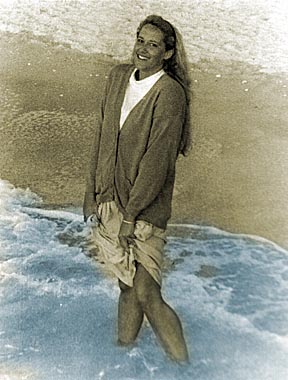
Clay
 so I was at this bar, on the coast of florida -- the west coast, the gulf side, you know. it was this place called lana kai, and my friend gave me a ride all the way from naples, which is a good forty-five minutes south of the place. and so we were sitting there at the bar, which is half indoors and half on the beach, and all these old men kept staring at my friend’s chest. a couple guys bought us beer and one guy asked me to dance. I was surprised he asked me to dance, and not my friend -- men were usually more attracted to her. so I was at this bar, on the coast of florida -- the west coast, the gulf side, you know. it was this place called lana kai, and my friend gave me a ride all the way from naples, which is a good forty-five minutes south of the place. and so we were sitting there at the bar, which is half indoors and half on the beach, and all these old men kept staring at my friend’s chest. a couple guys bought us beer and one guy asked me to dance. I was surprised he asked me to dance, and not my friend -- men were usually more attracted to her.
 but the guys were jerks anyway -- one looked like a marine with that haircut and must have been high on something, one looked like he decided to forgo hygiene, another was twice my age. it’s not as if I try to pick up men in bars anyway. so after a while I couldn’t stand being at the bar, next to the reggae band that was playing, so I begged my friend to come walk with me on the beach. but the guys were jerks anyway -- one looked like a marine with that haircut and must have been high on something, one looked like he decided to forgo hygiene, another was twice my age. it’s not as if I try to pick up men in bars anyway. so after a while I couldn’t stand being at the bar, next to the reggae band that was playing, so I begged my friend to come walk with me on the beach.
 christ, I felt like a ten-year-old with a bucket and shovel when I kicked off my black suede shoes and ran into the water. I always loved the feel of sand when it’s drenched in water. it feels like clay as it seeps around my toes, pulling me into the ground. christ, I felt like a ten-year-old with a bucket and shovel when I kicked off my black suede shoes and ran into the water. I always loved the feel of sand when it’s drenched in water. it feels like clay as it seeps around my toes, pulling me into the ground.
 so there I was, splashing in the water, wearing a black sequin dress, throwing my purse to the shore, taking a swig from my can of miller lite. this was life, I thought. pure and simple. an army couldn’t have dragged me out of the water. so there I was, splashing in the water, wearing a black sequin dress, throwing my purse to the shore, taking a swig from my can of miller lite. this was life, I thought. pure and simple. an army couldn’t have dragged me out of the water.
so my friend found some guy to hit on, as she usually does, and she wanted me to hit on his friend. I found the guy ugly as all sin, and impossible to talk to. I told him that one of the rafts on the shore was mine, and instead of driving to the bar I sailed. and he believed me. I told my friend flat out that I wouldn’t go with him. she was pissed that I didn’t find him good-looking.
 so then He strolled up from the bar to the beach, an intriguing stranger, and He walked up right next to me in the water, still wearing his shoes, seeming to know that I needed to be saved. as most knights in shining armor would. so then He strolled up from the bar to the beach, an intriguing stranger, and He walked up right next to me in the water, still wearing his shoes, seeming to know that I needed to be saved. as most knights in shining armor would.
 and He said hello to me, and He started talking to me, and He cracked a few jokes, and He made me laugh. and okay, I’ll admit it -- he was good-looking, really good looking. I remember at one point, looking at him made me think of a greek statue, He had this curly blonde hair, this sharp chin, these strong cheek bones. but those greek statues could never talk to me, they have no color, they don’t come alive. they’re made of stone. and He said hello to me, and He started talking to me, and He cracked a few jokes, and He made me laugh. and okay, I’ll admit it -- he was good-looking, really good looking. I remember at one point, looking at him made me think of a greek statue, He had this curly blonde hair, this sharp chin, these strong cheek bones. but those greek statues could never talk to me, they have no color, they don’t come alive. they’re made of stone.
 His name was Clay. and when we talked He crept into my pores, the way the sand made it’s way between my toes. His voice tunneled into me, boring me hollow, making me anxiously wait to be filled with more and more of His words. His name was Clay. and when we talked He crept into my pores, the way the sand made it’s way between my toes. His voice tunneled into me, boring me hollow, making me anxiously wait to be filled with more and more of His words.
 my friend disappeared with her new-found monosyllabic lover, for hours, until long after the bar closed, leaving me stranded. there I was, forty-five miles north of my home at 2:20 in the morning with no means of transportation. it could have been worse, I could have been somewhere other than on the beach, I could have been sober, and I might not have had a knight in shining armor named Clay to save me. my friend disappeared with her new-found monosyllabic lover, for hours, until long after the bar closed, leaving me stranded. there I was, forty-five miles north of my home at 2:20 in the morning with no means of transportation. it could have been worse, I could have been somewhere other than on the beach, I could have been sober, and I might not have had a knight in shining armor named Clay to save me.
 and as He drove me home (an hour and a half out of his way), I couldn’t help but run my fingers through his hair, it was an uncontrollable impulse, like the urge to drag your fingers deep into the wet sand. I told Him I was just trying to keep Him awake for the drive. and as He drove me home (an hour and a half out of his way), I couldn’t help but run my fingers through his hair, it was an uncontrollable impulse, like the urge to drag your fingers deep into the wet sand. I told Him I was just trying to keep Him awake for the drive.
 it’s almost better if I never see Him again. then I can always think of Him this way. it’s almost better if I never see Him again. then I can always think of Him this way.
|


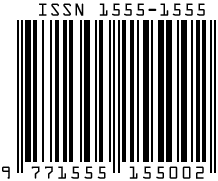


![]()





 A million tears shed
A million tears shed
























